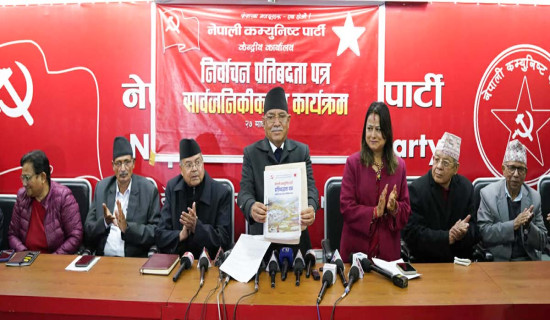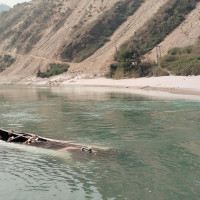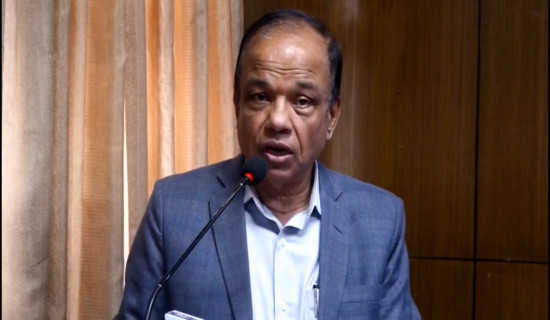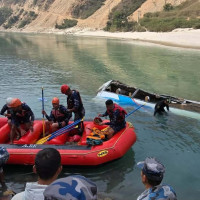- Wednesday, 11 February 2026
Children As Constituency Of Peace
Children belong to the populace under 16 years of age until they are entitled to the identity of citizenship. Nepal’s demographic structure is youthful. Forty per cent of the nation’s population is under 18 years of age. This vibrant age group represents the youth bulge. Sustainable peace rests on the fulfilment of their creative potential, proper education and the scope for the realisation of their vigour and vitality. Respect for the children’s rights upholds supreme importance to reduce fear and scarcity, fortify the peaceful atmosphere and cultured character of this nation. Children are future citizens. Investing in them amounts to building Nepal’s future. Their proper upbringing can protect the nation’s sanity. The quest for their rights to education, health and a decent life enshrined in the constitution is a vital precondition to their social and emotional stability and loyalty.
Nepali children from varied contexts, capabilities and histories have different needs, wants and aspirations. Their shared interest is to find a constituency of peace to nourish their cognitive, physical and psychological development. A nation thrives if its children acquire maturity in adulthood with proper skills, knowledge and information, adapt to changing labour markets and spur creative interest in social progress. The balance of personal taste and social responsibility can be enthused in early childhood, enlarging the horizon of their perspectives about life’s possibilities. As Nepali society evolves with the changing spirit of world society, preparing children to undertake the challenges arising out of this is crucial.
Full potential
Creation of favourable structural conditions of peace is vital to enable children to realise their full potential. Violence upturns the natural evolution of society while a culture of peace enables all to exercise their intrinsic talents, intelligence and genius. The creation of child-friendly family, community, schools, recreational centres and local public institutions plays a central role in building their self-confidence to debate fearlessly in the public sphere, acquire a sense of equality and participate in numerous tasks. Their exposure to modern education and rituals deeply shapes their feelings, sentiments and conduct.
Nepal’s legal system is becoming rights-oriented, which in the past was duty-based, a duty to uncritically obey parents, priests and authorities expecting love and affection in return. Modern values are corroding the prejudice that children are ignorant. In 1924, the Geneva Declaration stipulated the right to development, relief, assistance and protection of children. Later, the UN General Assembly adopted 10 principles and held a convention on the Rights of the Child. They have set a universal template for the rights of children.
The Children’s Rights Act 1992 is the first law that spells out children's general welfare, espousing their identity, protection, education, non-discrimination, development, non-exploitation, juvenile justice, etc. The constitution ensures every child's right to education, health, maintenance, proper care, sports, entertainment and overall personality development and bars physical and mental torture. Nepal passed the Child Labour’s Act in 1991 to deal with hazardous conditions in which they work, igniting a hope for a decent society and ensuring food, shelter, residence, education, health and care. But children from poor families lack adequate choices, while conflict victims suffer from structural injustice. Nepali state’s promise of stable peace can become precarious if social and economic opportunities are unfair. The local governance must be carefully designed to make provisions for children actionable.
The existence of marginalisation stifles the overall development of children from poor families. Outdated customs also reinforce this. Common ills faced by girl child are offering them to temples, child marriage, corporal punishment, domestic violence, teen pregnancy, prostitution, trafficking, Chaupadi, unsafe abortion, sexual exploitation, caste-based discrimination and conflict-related violence. This requires strengthening the legal institution of children, enabling them to exercise their basic rights. Nepal needs to abolish fatalism, blind faith, prejudice and evils through critical education.
During the armed conflict, children were coercively recruited as soldiers and informers who were later disqualified for the jobs. Many Nepali children are in a vulnerable situation owing to their families’ inability to support them. Those victims of conflict, domestic violence and displaced people have become street children. The estimated number of street children in Nepal is 5,000. This number is growing with the decline in living standards, divorce rate and poor household economy. Renewing hope requires monitoring of children's rights and penalising the wrongdoers. There are several child rights institutions in the nation with a special job to assist their rehabilitation and provide them with a family atmosphere.
Zone of peace
Several children's organisations are dealing with children’s diverse issues. Nepal has also initiated the campaign “Children as Zone of Peace” in 2001 to protect children during the conflict period. Its network spreads across various areas. So does its partnership with international philanthropic organisations, national, provincial and local NGOs, CBOs and informal institutions with the agenda of peace. Similarly, the Nepali government has endorsed a directive declaring all schools and school buses a “zone of peace.” They helped children escape violence and keep their societal ties.
Owing to peace-enhancing activities, such as display of posters, essay and poem competition in schools, public demonstration with play cards depicting peace scenes, exhibition of children victims of violence, etc., have sensitised the public and the government about the necessity of peace and justice. As a result, moderate progress in the vital indicators of peace has emerged in the nation. Children’s rights are related to the democratic spirit of conducting politics by peaceful means.
Its primary duties are security, order and service delivery and to fulfil the rights of all citizens, including children. It provides basic services like public security, education, health, housing, food, nutrition, drinking water, etc., to every Nepali. Execution of the rights of Nepali children requires incessant monitoring, evaluation and promotion of the conditions of life, choice and opportunities. The state, NGOs, civil society and international institutions have to coordinate and strengthen children’s needs to enlarge the constituency of peace.
(Dahal holds an MA in Peace and Conflict from Otto-Von Guericke University, Germany.)





-square-thumb.jpg)


-square-thumb.jpg)








